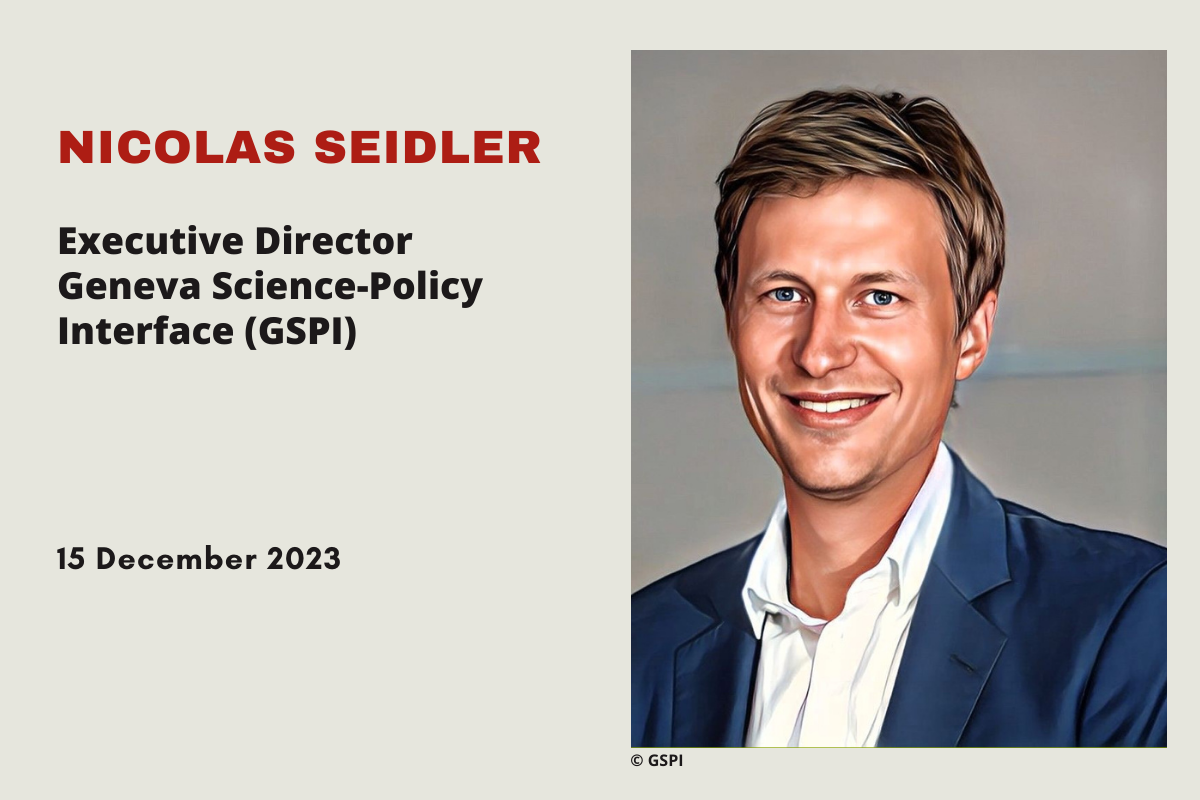The interview | Nicolas Seidler
 |
How would you present your organization in a few words? What entails your position? What is your goal? |
The Geneva Science-Policy Interface (GSPI) is a neutral platform with the mission to strengthen engagement and collaboration between researchers and international policy professionals from the Geneva multilateral ecosystem.
We are hosted, supported, and initiated by the University of Geneva, and also supported as part of the Swiss Foreign Affairs’ strategy on science diplomacy. We are governed by diverse leading research institutions in Switzerland and Europe.
Our mission is to help researchers, policy professionals and practitioners collaborate to produce science- and evidence-based solutions to global challenges such as the triple planetary crisis, biodiversity loss, migration issues, global pandemics, and managing risks linked to new technologies, to name a few.
We are an honest broker that works across sectors and disciplines to support professionals from academia and intergovernmental organisations with new opportunities, skills, networks and incentives for science-policy collaborations.
Our programs and activities involve supporting collaboration projects through strategic advice and seed funding, offering learning opportunities such as workshops and week-long training courses, and developing practical resources and toolkits to span science-policy boundaries in the international Geneva ecosystem.
 |
Among the concentration of actors in Geneva (IOs, NGOs, permanent missions, academia, and the private sector), who do you work with and how? |
We collaborate with a range of policy experts in international organisations, including professionals from research departments. Secretariats from these organisations often seek our help to connect them with relevant researchers on specific topics, or to jointly develop science-policy engagement activities.
Recently, the U.N. Institute for Disarmament Research (UNIDIR) invited us to advise Member States on their process of strengthening science review mechanisms related to the Biological Weapons Conventions. We've also assisted organisations like the U.N. Research Institute for Social Development (UNRISD) in organising science-policy dialogues on issues such as migration policies. This past November, we co-organised a workshop with UNIGE and WHO to brainstorm on how to translate diabetes research findings into tangible policy actions. These examples add to the dozens of collaboration projects we have supported involving the likes of IOM, WHO, UNITAR, OHCHR, UNEP, and UNECE.
On the academic side, we are increasingly solicited by universities aiming to improve their engagement with international organisations and policy processes related to multilateral conventions and negotiations. We work extensively with early-career researchers, supporting them through strategic advice and financial aid. Our annual call for projects, the Impact Collaboration Programme, serves as a channel for this support and as a showcase of fruitful collaborations between scientists and professionals working in international organisations and NGOs.
Additionally, we collaborate closely with thematic platforms in Geneva. For example, we recently co-organized a public workshop on the strengths and limits of global science-policy panels (such as the IPCC) with the Geneva Environment Network. We are also one of the Coalition members behind the annual Science Diplomacy Week in Geneva, which is coordinated by GESDA, and we contribute to a science diplomacy training module organised by the Diplo Foundation.
 |
What are the strengths and weaknesses of Geneva with regards to the development of your activity? |
As the world capital of multilateralism, Geneva has all the key ingredients for a thriving science-policy ecosystem. Numerous international organisations feature chief scientists and research departments that not only develop cutting-edge knowledge internally but also through academic partnerships. It is worth reminding that Geneva (through the WMO) acts as the host of the International Panel on Climate Change (IPCC), arguably one of the most prominent science-policy bodies focused on the environment and climate change.
This multilateral setting is surrounded by a dense network of research-intensive academic institutions in both Geneva and Switzerland at large, which maintain robust connections with counterparts on all continents. These institutions generate a wide array of scientific insights and methodologies that are essential to strengthen policy decisions spanning from migrations to human rights, from global health to environmental response.
As an illustration of this rich ecosystem, we recently coordinated the production of a policy brief on the role of Swiss science and diplomacy to catalyse a One Health approach. This approach considers the interconnected health of animals, humans, and the planet, and gained significance due to COVID-19. Based on a mandate by the Swiss Foreign Affairs, we collaborated with experts from UNIGE’s Institute of Global Health and consulted 30+ global and Swiss experts (WHO, WTO, SwissTPH, etc.). Together, we formulated science-informed policy recommendations to prevent and address future pandemics and zoonotic outbreaks.
Despite inherent strengths in the Geneva ecosystem, more needs to be done to recognize and support individuals and institutions devoted to facilitating and reinforcing engagement between scientists and policy professionals. Our endeavours, alongside those of partner platforms, mark substantial strides toward enhancing this field of practice. These collective efforts set the stage for Geneva to emerge as an inspiring leader for science-driven solutions to pressing global issues.
 |
|
Looking ahead, my vision encompasses a stronger, more incentivized integration of scientists as key contributors to solutions for both global and local governance challenges.
Getting there demands growing support and willingness from international organisations and governments to work more closely with scientists, through formal and informal avenues. This vision also requires increased acknowledgment and support within academia for scientists who invest part of their time in policy engagement. While there have been positive developments in this area, academia's underlying incentive structures—such as scientific publications and citations—are deeply entrenched and provide limited rewards to projects targeted towards policy impact. Existing academic pathways must coexist with fresh methods to value the societal involvement of researchers.
While several formal interfaces and panels currently revolve around specific conventions and treaties, it will be interesting to track the recently established United Nations' Science Advisory Board, which aims to strengthen the interface between the scientific community and U.N. decision-making at the highest levels of governance. This development could empower scientists with a stronger voice in shaping future multilateral agendas.
Ultimately, I would like to see more resourced individuals and institutions dedicated to facilitating impactful collaboration between scientists and policymakers. This distinct and important role should hopefully garner more recognition and support, therefore maximising successful cooperation between researchers and policy experts in tackling pressing issues
 |
|
Occasionally, concerns arise about the potential consequences of promoting science-policy engagement: the fear of politicising science or fostering technocracies. I empathise with these apprehensions, yet I am steadfast in my conviction that nurturing intermediary roles and enhancing the engagement skills of both scientists and policy professionals can foster robust collaborations, while respecting the distinct boundaries of each community.
Scientists primarily focus on conducting rigorous research to establish facts and explain the world that surrounds us, while policy actors grapple with making collective and public decisions within the complexities of uncertainty and other constraints. It is imperative that both worlds cultivate a baseline ability to interact with one another, all while leveraging intermediaries and platforms designed to facilitate spaces for collaboration. This is the essence of what GSPI aspires to contribute—as an asset to the Geneva community and Switzerland's role in the global multilateral landscape.
